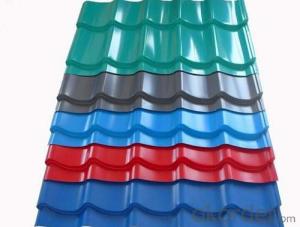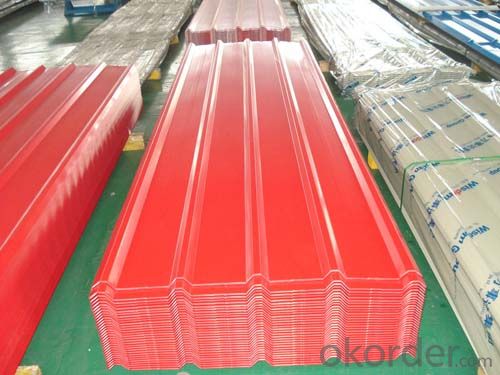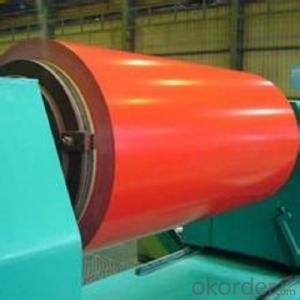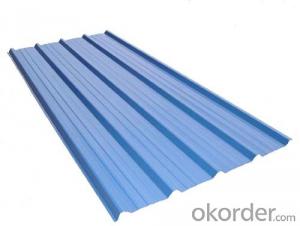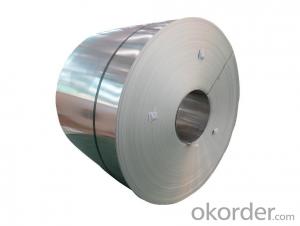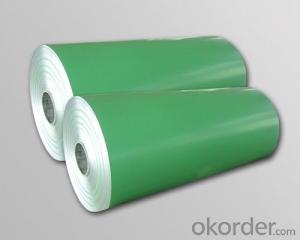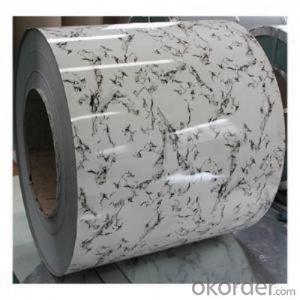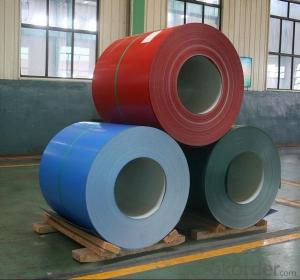1060 Aluminum Coils Clour Corrugated Aluminum Cladding Sheet Metal for Roofing
- Loading Port:
- China main port
- Payment Terms:
- TT OR LC
- Min Order Qty:
- 5 m.t.
- Supply Capability:
- 5000 m.t./month
OKorder Service Pledge
OKorder Financial Service
You Might Also Like
Specification
1. Description of Clour Corrugated Aluminum Cladding Sheet Metal for Roofing
Grade and Temper | Alloy: 1100, 1050, 1060, 2024, 3003, 5052, 5754, 6061, 6063, 7075, etc. Alloy: O-H112 |
| Width | 20mm -2300 mm available |
| Thickness | 0.2mm - 200mm |
| Coil Specifications | I.D.: 405mm, 505mm, with aluminum core, paper core or without core available |
| Packing Detail | Wooden pallet either eye to wall or eye to sky |
2. Application of Clour Corrugated Aluminum Cladding Sheet Metal for Roofing
Aluminum Roofing Sheet, Aluminum Suspended Ceiling, Aluminum Sandwich Panel, Wall Cladding Panel, Roller Shutter, Metal Roofing, Conner Bead, etc.
3. Feature of Clour Corrugated Aluminum Cladding Sheet Metal for Roofing
1.High temperature resistant
2.Weathering resistant
3.Scrubbing resistant
4.Sound insulation
5.Acid or alkali proof
6. Fireproof
7.Light weight material is easy to construct and install
4. Certificate:
SGS and ROHS(if client request, paid by client), MTC(plant provided), Certificate of Origin(FORM A, FORM E, CO), Bureau Veritas and SGS (if client request, paid by client), CIQS certificate
5. Image of Clour Corrugated Aluminum Cladding Sheet Metal for Roofing
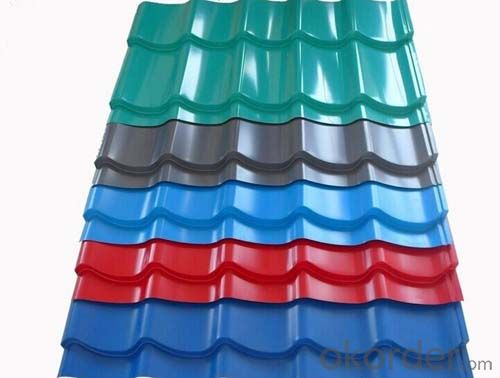
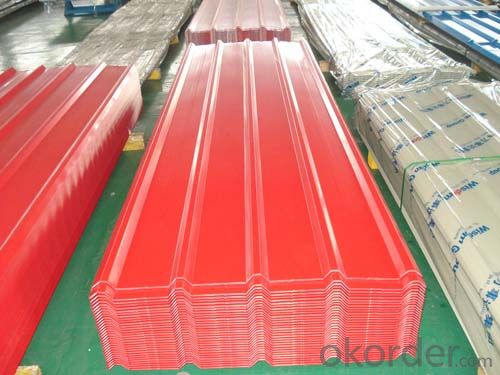
5. FAQ
1) What is the delivery time?
Dpends on actual order, around 20 days
2) What is the QC system:
We have QC staff of 20 persons and advanced equipment, each production is with MTC traced from Aluminum ingot lot.
3) What market do you mainly sell to?
Australia, America, Asia, Middle East, Western Europe, Africa etc
- Q: Can aluminum coils be used in corrosive gas environments?
- Yes, aluminum coils can be used in corrosive gas environments. Aluminum is known for its excellent corrosion resistance, especially in atmospheric conditions. It forms a protective oxide layer on the surface that protects the metal from further corrosion. However, it is important to note that aluminum can be susceptible to certain corrosive gases, such as chloride and sulfur compounds. In such cases, additional protective measures, such as surface treatment or coating, may be necessary to ensure the longevity and performance of the aluminum coils in corrosive gas environments.
- Q: How do aluminum coils perform under high-temperature applications?
- Aluminum coils are known for their excellent heat resistance and performance in high-temperature applications. Due to their low melting point of around 660 degrees Celsius (1220 degrees Fahrenheit), aluminum coils can withstand and operate efficiently under elevated temperatures. Aluminum has a high thermal conductivity, meaning it can quickly transfer heat away from the coil, preventing overheating and potential damage. This property allows aluminum coils to effectively dissipate heat, resulting in improved thermal management and enhanced performance in high-temperature environments. Moreover, aluminum coils exhibit good corrosion resistance, which is crucial in applications where heat and moisture are present. The oxide layer that naturally forms on the surface of aluminum provides a protective barrier against corrosion, ensuring the longevity and reliability of the coil even in challenging conditions. Furthermore, aluminum coils are lightweight and possess excellent formability, allowing for easy installation and integration into various systems and applications. This versatility makes them suitable for a wide range of high-temperature applications, including heat exchangers, automotive components, HVAC systems, and electrical devices. However, it is important to note that extreme temperatures beyond the melting point of aluminum can cause the material to weaken or deform. Therefore, it is essential to consider the specific temperature requirements and limitations of the aluminum coil before implementing it in a high-temperature application.
- Q: Is it possible to utilize aluminum coils for crafting artistic installations or distinctive creations?
- <p>Yes, aluminum coils can be used to create art installations and other unique creations. Their malleability, durability, and lightweight nature make them ideal for sculptural works. Artists can bend, shape, and weld aluminum coils into various forms, offering a wide range of design possibilities. The material's reflective surface can also add visual interest, especially when used in installations that interact with light and shadow. Additionally, aluminum's resistance to corrosion makes it suitable for outdoor art pieces, ensuring longevity and low maintenance.</p>
- Q: What specific conditions or criteria must be met when utilizing aluminum coils?
- <p>There are several special requirements for using aluminum coils. They should be stored in a dry and clean environment to prevent corrosion. The coils must be handled carefully to avoid scratches or dents that could affect their performance. When used in manufacturing, the specific alloy type and temper of the aluminum coil must be considered as they influence properties like strength and malleability. Additionally, the thickness and width of the coil should match the requirements of the application to ensure proper fit and functionality. Adherence to safety standards during the handling and processing of aluminum coils is also crucial to prevent accidents and ensure quality control.</p>
- Q: Are there any specific guidelines for the installation of aluminum coils?
- Yes, there are specific guidelines for the installation of aluminum coils. These guidelines typically include recommendations for proper handling, storage, and transportation of the coils, as well as instructions for their secure attachment, alignment, and electrical connections. It is important to follow these guidelines to ensure the efficient and safe installation of aluminum coils.
- Q: should i have a paper between aluminum siding and the wood
- Aluminum siding can be vented with round pop-in perforated vent plugs, these are very easy to install. I would really like to know how do you know there is condensation behind your siding?
- Q: Can aluminum coils be used in food processing or packaging?
- Food processing or packaging can use aluminum coils. Aluminum is commonly used in the food industry because of its lightweight, non-toxic, and corrosion-resistant properties. These qualities make it an ideal material for food processing and packaging. Aluminum coils are capable of producing various food packaging products like cans, lids, foils, and trays. They create a protective barrier against oxygen, moisture, and light, which help maintain the freshness and quality of food items. Moreover, aluminum coils are malleable, easy to shape, and seal, resulting in efficient and effective packaging solutions. In general, aluminum coils are highly favored for food processing and packaging due to their versatility, durability, and safety.
- Q: This question asks for criteria or methods to determine if a used aluminum coil is safe for reuse.
- <p>To determine if a used aluminum coil is safe to use, consider the following: Check for any visible signs of damage such as cracks, dents, or corrosion. Ensure the coil has been properly cleaned and sanitized to remove any residues or contaminants. Verify that the coil has not exceeded its recommended lifespan or usage limits. Consult the manufacturer's guidelines for any specific safety checks or maintenance requirements. If in doubt, it's best to consult with a professional or replace the coil to avoid potential safety hazards.</p>
- Q: Is it possible to use aluminum coils in the creation of toys or games for children?
- <p>Yes, aluminum coils can be used to make toys or games for children, but safety considerations must be taken into account. Aluminum is a lightweight, durable, and non-toxic material, making it suitable for various applications, including children's toys. However, it's crucial to ensure that any aluminum used in toys is properly treated to prevent sharp edges or small parts that could pose a choking hazard. Additionally, the toys or games should be designed and manufactured to meet safety standards and regulations to protect children from potential harm.</p>
Send your message to us
1060 Aluminum Coils Clour Corrugated Aluminum Cladding Sheet Metal for Roofing
- Loading Port:
- China main port
- Payment Terms:
- TT OR LC
- Min Order Qty:
- 5 m.t.
- Supply Capability:
- 5000 m.t./month
OKorder Service Pledge
OKorder Financial Service
Similar products
Hot products
Hot Searches
Related keywords
